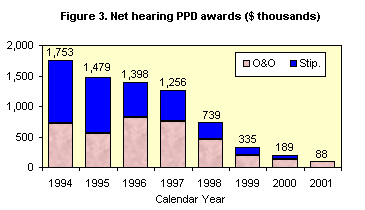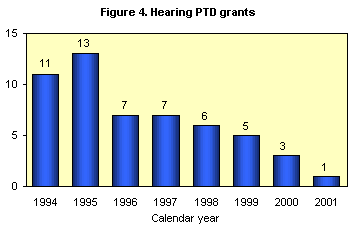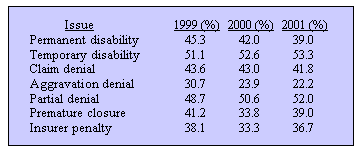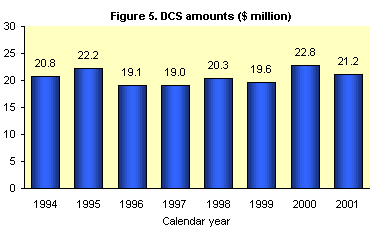
By Russ Reed
Requests
The Oregon Workers' Compensation Board received 11,074 requests for hearing
in 2001, 3.9 percent more than in 2000. This count includes 939 stipulations
received without a prior hearing request. The worker requested the hearing
in 87.5 percent of the cases (excludes "received stipulations").
Closures
In 2001 there were 10,269 cases closed, 6.1 percent fewer than during
the previous year and the fewest since 1979.
Notes: This report excludes safety cases. The data below, except Figure 1, include only cases involving compensation to the worker, so cases dealing solely with non-complying status or civil penalty are excluded. Discussions of the relative frequency of issues and their dispositions apply to opinion and order and stipulation (includes disputed claim settlement) cases.

There were 2,212 cases closed by O&O, 21.6 percent of all cases (the second-lowest percentage on record). Stipulations closed 5,210 cases (51.0 percent), while dismissals and withdrawals closed 2,798 cases (27.4 percent).
SAIF was the insurer in 32.7 percent of the cases, the highest percentage since 1997.
Issues
Figure 2 depicts the numbers of issues resolved at hearings. Claim denial
was the most frequent issue (as it's been every year since 1988), with
39.7 percent of all cases. Partial denial was a close second, with a record-high
38.7 percent. Aggravation was involved in a record-low 4.5 percent of
cases.

Permanent disability
Cases dealing with permanent disability dropped to a count of 456, 6.1
percent of all cases (both record-low values). Hearings orders granted
just one permanent total disability award (by stipulation) and awarded
a net $87.9 thousand in permanent partial disability, less than half of
2000's record-low total. See Figures 3 and 4. There was one PTD rescission.


The percentage of cases granting an increase in disability was 31.4 percent, up from 2000's record-low 28.8 percent. The average PPD increases were 12.7 scheduled degrees, 26.3 unscheduled degrees, and 19.0 degrees combined.
Issue dispositions. The percentages of O&O cases decided in favor of the worker were as follows:

The year 2001 rate for permanent disability was the lowest of the past 8 years. The favorable (acceptance) rates for claim denial and aggravation denial were the second lowest and lowest on record, respectively, while that for partial denial was the third highest ever. For the disability issues, the rates reflect dispositions of "increase" (24.6 and 48.2 percent, respectively, for permanent and temporary disability), plus insurer or employer hearing requests when the disability award was affirmed. The favorable rates for premature closure and penalty were above their record-low 2000 percentages.
Disputed claim settlements
Figure 5 depicts the total value of DCSs, amounts paid to workers as consideration
for not contesting a denial. The 3,899 DCS cases constituted 74.8 percent
of all stipulations and 38.2 percent of all orders, both record-high percentages.
DCSs accounted for 80.5 percent of all hearing denied claims (excludes
aggravations). The issue was partial denial in a record-high 51.2 percent.
DCSs in 2001 included claimant attorney fees of almost $4.2 million, 49.1
percent of all fees at hearing. The average DCS amount was $5,435, about
4.0 percent less than in 2000.

Time lags
For all O&O cases, the median time from hearing request to order was
188 days (6.2 months), the same as for 2000. For O&O cases without
a postponement, the median request-to-order time was only 138 days (4.5
months). For all order types, the median time was 126 days. (Note: these
lag times include time the record was kept open after the hearing.)
Attorney fees
Fees awarded to workers' attorneys totaled about $8.54 million, 6.4 percent
less than in 2000 and about the same as in 1999. The average fee was $1,617
(combined out-of-compensation and assessed), slightly less than for 2000.
About 51.8 percent of all hearings fees were paid out of worker compensation
or DCS consideration.
Mediation activity
In 2001 administrative law judges completed 248 mediations in order to
settle disputes without formal litigation. Over 85 percent of these mediations
resulted in settlement, and 92 percent of the settlements took the form
of a DCS. The average mediation required 13.1 work-hours on the part of
the judge. About 36 percent of the mediations were about psychological
disease claims and a record-high 51 percent included non-workers' compensation
issues.
If you have questions about the information contained in this document please contact by e-mail or phone: Russell Reed, Research Analyst, Research & Analysis Section, Information Management Division (503) 947-7343.
The information in IMD publications is in the public domain and may be reprinted without permission.
This document was originally published in October
2002 .
[Printed form: 440-2106(10/02/IMD)]
In compliance with the Americans with Disabilities Act (ADA), this publication is available in alternative formats by calling (503) 378-4100 (V/TTY).